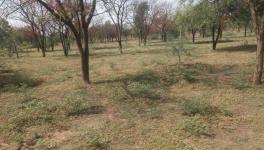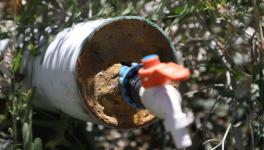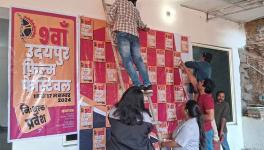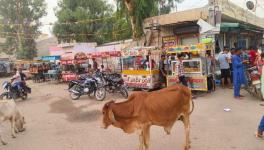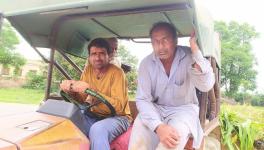Lung Disease Turns Budhpura into 'Village of Widows'
In Budhpura, unregulated and unsafe mines are thriving, rights groups say
Jumma Bai, a 40-year-old widow, holds a hammer and chisel as she makes her way to the mining site.
She works at a mine that took away the life of her husband two decades ago. Each day, she is joined by three of her daughters and other widowed women who work alongside her.
Their heads are covered with the loose ends of their saris as they strike huge stones with hammers, inhaling the fine silica dust that fills the surrounding air.
With their bare hands, they carve and break sandstones for nearly 10 hours a day.
Jumma and most of her fellow miners have tragically lost their husbands to silicosis, a deadly and incurable lung disease caused by the inhalation of the silica dust.
"There were a lot of struggles after the death of my husband. There were times when there was no flour at home to cook food. We used to sleep hungry," she told DW while breaking stones.
"When my daughters grew up," Jumma said, "I asked them to study, but they said 'mother how will you feed us alone,' and decided to come to work with me."
The only means of livelihood
Due to prolonged exposure to dust, Jumma wakes up with a headache and chest pain on most days. Despite the health problems, she goes to work as she sees no other option to feed her family.
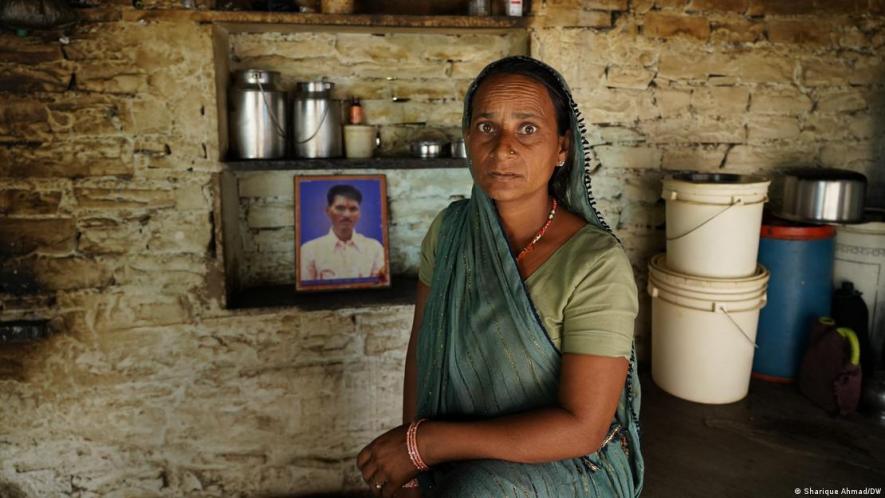
Jumma has lost her husband to silicosis, a deadly and incurable lung disease caused by the inhalation of the silica dust
She is not alone. Her neighbor, 38-year-old Kaushalya Bai, was diagnosed with silicosis three years ago. She was only 16 years old when she started working in these vast sandstone mines.
She is now chronically ill and looks frail. The disease left her struggling to speak. The doctors advised her to stop working on stone and stay away from dust, but she still goes to the mine three days a week as she has four children to feed.
Recently, her eldest son Mahaveer, 16, has taken on the responsibility of supporting his sick mother and the family. He dropped out of school and now works as a full-time miner. Kaushalya Bai's husband, Kanhaiya Lal, also died of a lung disease in 2015.
India's sandstone hub
The village of Budhpura, located in the northwestern state of Rajasthan, is the epicenter of India's sandstone industry.
The men here died one after another after toiling in the expansive sandstone mines and inhaling silica dust found in rock, sand and quartz every day until they were eventually diagnosed with silicosis.
As time passed, almost the entire male population of Budhpura succumbed to this disease. Today, this place is known as the "village of widows." But the tragedy does not end there. With no other employment options left, the widows have been compelled to undertake the same tasks that claimed their husbands' lives.
In Budhpura, unregulated and unsafe mines are thriving, rights groups say. The lack of health safeguards is a concern for women working in this industry as the rights of workers are flouted and laws are hardly enforced, miners told DW.
According to one estimate, there are 2.5 million mine workers in Rajasthan, and a large number are at risk of silicosis. However, the exact number of people suffering from the disease remains unknown.
The village also serves as a prominent hub for sandstone exports to Europe.
A 40-page report, "Blood Stone 2022," notes Germany as one of the top 10 countries that import sandstone from India. The report was exclusively shared with DW by the Mine Labor Protection Campaign (MLPC), a non-profit that advocates for mine workers' rights.
The group estimates the value of sandstone exports from India to Germany at $4.43 million (€4.06 million) in 2021-2022, slightly down from $4.83 million from a year ago.
The United Kingdom is the top importer of Indian sandstone, according to the MLPC.
Fight for stricter regulations
MK Devarajan, a former member of the Rajasthan State Human Rights Commission, spent many years fighting for the rights and safety of mine workers.
During his tenure, he urged the Indian government's Director General of Mines Safety (DGMS), who is in charge of mine worker welfare, to tighten the rules by canceling licenses of those who flout regulations.
Devarajan also helped formulate the state policy on silicosis.
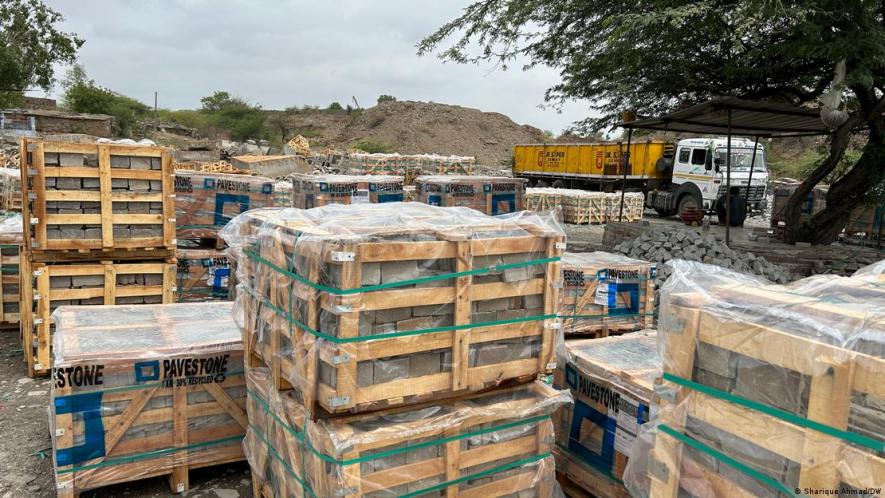
Budhpura village also serves as a prominent hub for sandstone exports to Europe
Now the Rajasthan government is addressing the health issue by offering financial compensation to widows and patients.
Since 2019, the state government has been providing 200,000 rupees (€2,218, $2,420) as compensation to people diagnosed with silicosis and 300,000 rupees (€3,328, $3,632) to their families after their death.
"This is not even the tip of the iceberg. The problem is much bigger. If the government does not intervene properly, with time we will witness a massive increase of silicosis patients," Devarajan told DW in a phone interview.
"Government needs to enforce and crack down on illegal mines to stop this crisis."
Helping widows to secure compensation
A few hundred meters away from the mining site, the non-profit MLPC was organizing a legal camp for the women who have lost their husbands to silicosis. Dozens of widows gather to attend the legal camp that helps them in claiming financial compensation from the government. Some of the widows attending have been fighting for compensation for years.
The group CEO Rana Sengupta headed the legal camp. He was checking the documents of widows and registering their names. His team of lawyers was preparing a long list of women who lost their husbands to silicosis. He said that getting financial compensation from the state is a long and daunting task.
"There is no financial penalty on mine owners and they don't care when they [miners] die or live. So, the government needs to wake up as there are so many mine workers who have died. And we cannot bear the loss of human life anymore," Rana told DW.
Yogesh Gupta has been operating mines in different parts of Rajasthan. Previously, he owned a sandstone mine in Budhpur village, but he has since closed it.
Gupta blames the rise of unregistered and unregulated mines for the grim situation.
"These unregistered and unregulated workers work without any safety helmets for long hours. The rise of new or mafia mine owners who do not follow any regulations is leading to this massive health crisis," Gupta told DW.
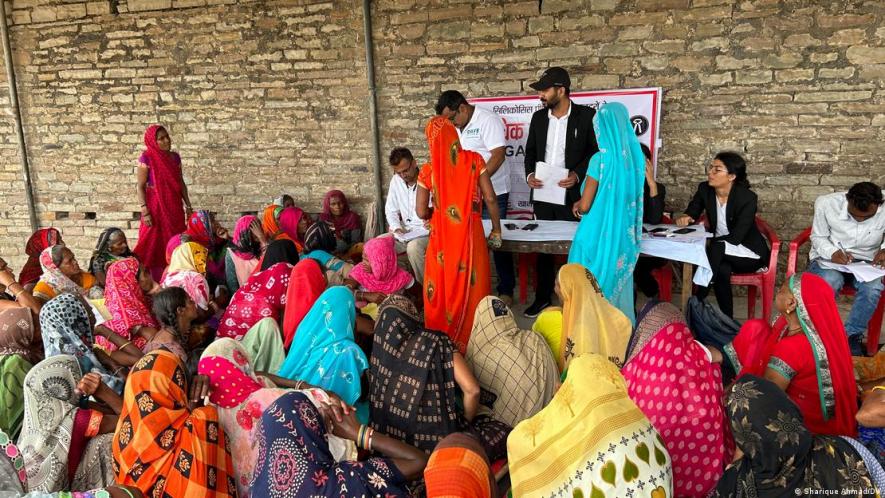
Dozens of widows gather to attend the legal camp that helps them in claiming financial compensation from the government
Lack of health care access
Outside the village, dozens of mine workers who have been diagnosed with silicosis are pouring into the local hospital in the town of Bundi on a daily basis. There were just a couple of doctors attending to patients and they lacked equipment that could be used to diagnose or treat respiratory diseases.
According to the hospital medical officer, Dr. Jitendra Kumar, the lack of human resources as well as inadequate training among doctors related to silicosis have resulted in a substantial number of misdiagnoses over the years.
During DW's visit to the facility, Dr. Kumar was examining a mine worker who was diagnosed with silicosis two years ago and was complaining of severe chest pain and breathlessness. The doctor said his lungs were completely damaged.
"In our hospital, every day we have 50-60 patients who have respiratory problems and among them 50% cases are of those who are diagnosed with silicosis. This is an alarming disease. There are cases which have reached the third stage and are in a dangerous zone," he said.
Still, Jumma and other women continue to risk their lives without any proper support or protection. They work in the mines despite splitting headaches and congested lungs.
Remembering her husband, Jumma pointed towards the mines and said: "You see these mines. My husband fell sick working there."
Edited by: Srinivas Mazumdaru
Get the latest reports & analysis with people's perspective on Protests, movements & deep analytical videos, discussions of the current affairs in your Telegram app. Subscribe to NewsClick's Telegram channel & get Real-Time updates on stories, as they get published on our website.










